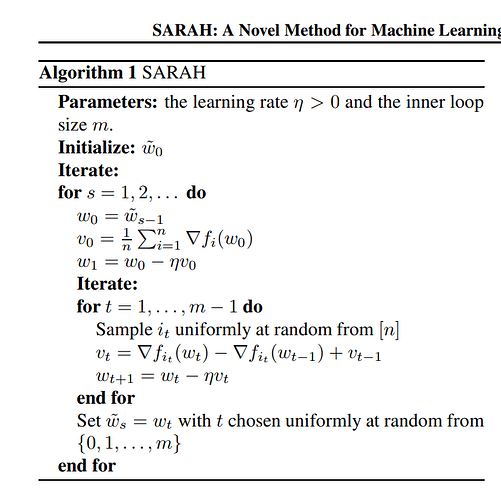Hey, I was trying to implement sarah optimization algorithm.
And here is the code.
1) Model
Linear model f = wx + b , sigmoid at the end
class Model(nn.Module):
def init(self, n_input_features):
super(Model, self).init()
self.linear = nn.Linear(n_input_features, 1)
def forward(self, x):
y_pred = torch.sigmoid(self.linear(x))
return y_pred
model = Model(n_features)
def binary_cross_entropy_loss(outputs, targets):
epsilon = 1e-4 # small epsilon value to ensure numerical stability
loss = - (targets * torch.log(outputs + epsilon) + (1 - targets) * torch.log(1 - outputs + epsilon))
return torch.mean(loss)
2) Loss and optimizer
num_epochs = 100
learning_rate = 0.01
criterion = binary_cross_entropy_loss
optimizer = torch.optim.Adagrad(model.parameters(), lr=learning_rate)
train_losses = np.zeros(num_epochs)
3) Training loop
for epoch in range(num_epochs):
# Forward pass and loss
y_pred = model(X_train)
loss = criterion(y_pred, y_train)
old_model = copy.deepcopy(model)
optimizer.zero_grad() # Clear previous gradients
loss.backward(retain_graph=True) # Compute gradients using backward pass
# Access gradients and store them in a variable
gradients = [param.grad for param in model.parameters()]
V0 = [torch.zeros_like(p) for p in model.parameters()]
for i, w in enumerate(model.parameters()):
V0[i] += gradients[i]
w.data = w.data - V0[i] * learning_rate
m = 2*num_epochs
inside_loop = np.zeros(m)
n = len(X_train)
for t in range(0, m):
# Sample a random index uniformly at random from [n]
i_t = random.randint(0, n - 1)
# Access the sample at index i_t
sample = X_train[i_t]
target = y_train[i_t]
### One sample and it's gradient with updated model
sample_pred = model(sample)
inner_loss = criterion(sample_pred, target)
# Backward pass
optimizer.zero_grad() # Clear previous gradients
inner_loss.backward(retain_graph=True) # Compute gradients using backward pass
# Access gradients and store them in a variable
inner_gradients_wrt_updated_model = [param.grad for param in model.parameters()]
### One sample and it's gradient with old model
sample_pred_old = old_model(sample)
inner_loss_old = criterion(sample_pred, target)
# Backward pass
optimizer.zero_grad() # Clear previous gradients
inner_loss_old.backward(retain_graph=True) # Compute gradients using backward pass
# Access gradients and store them in a variable
inner_gradients_wrt_old_model = [param.grad for param in old_model.parameters()]
for c,d in enumerate(model.parameters()):
V0[c] = inner_gradients_wrt_updated_model[c] - inner_gradients_wrt_old_model[c] + V0[c]
d.data = d.data - learning_rate * V0[c]
inside_loop[t] = loss.item()
# zero grad before new step
optimizer.zero_grad()
train_losses[epoch] = loss.item()
if (epoch+1) % 10 == 0:
print(f'epoch: {epoch+1}, loss = {loss.item():.4f}')
In this code inner_gradients_wrt_old_model always is None. And I failed to solve it. If you can help me regrading this I will be grateful to you.
I really appreciate any help you can provide.
And let me know if the code match with algorithm implementation or not.
